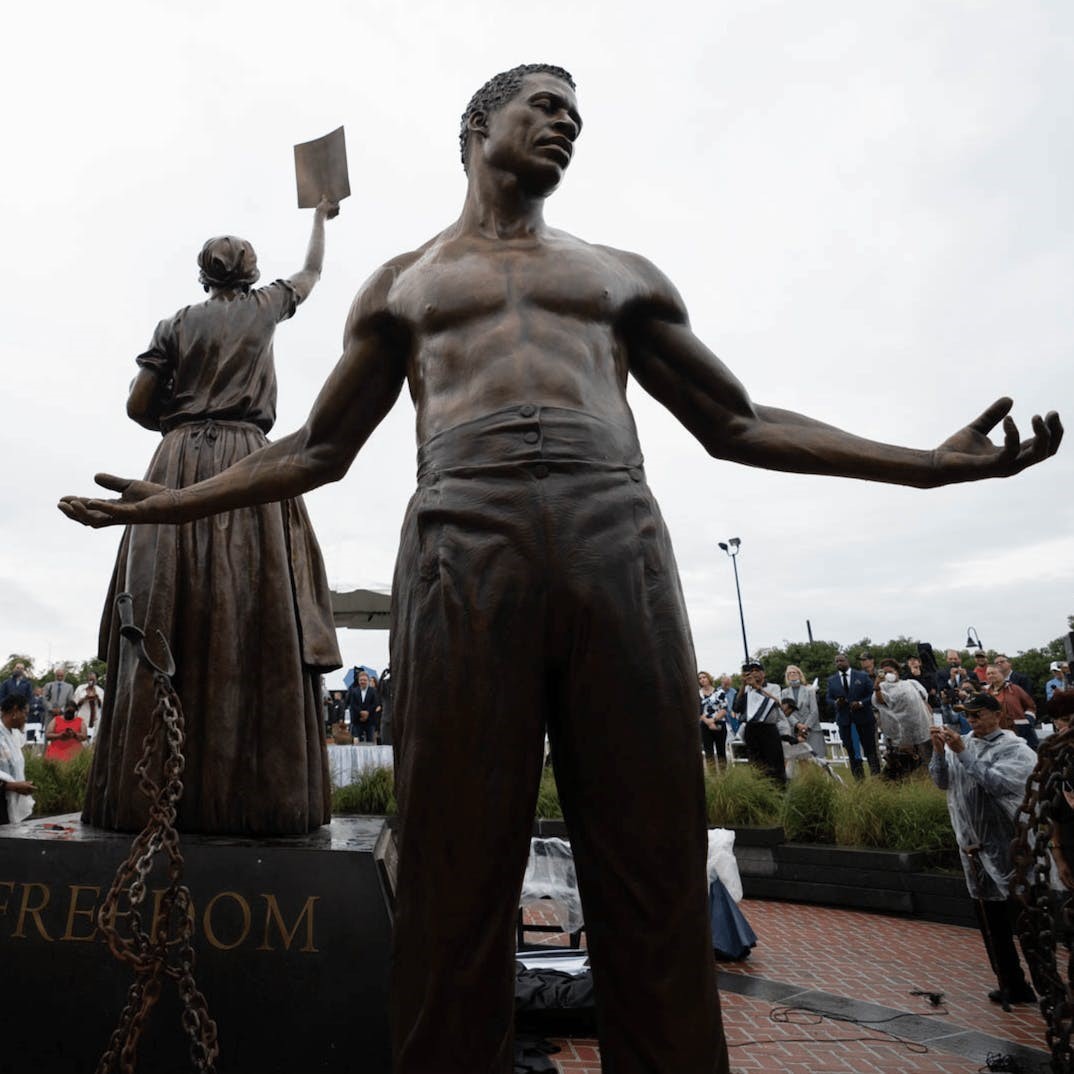
The Emancipation and Freedom Monument in Richmond, Virginia features two 12-foot bronze figures—a man, and a woman holding an infant—representing those newly freed from slavery. A pedestal, which elevates the female figure, features the images and contributions of ten Virginians whose efforts represent the sacrifices of those eager to gain freedom including Nat Turner.
Nat Turner: A preacher of conflict and controversy
February 28, 2023
Growing up in Virginia, I was keenly aware of the “institution of slavery” and the impact it had on America and particularly African Americans. It was striking how many notable figures were lifted as being instrumental in the struggle for freedom. However, little was said about a preacher and prophet who lived not far from me, two centuries prior. Nat Turner lived an hour away from where I grew up. Yet I did not come to learn that he was a literate preacher until I was an adult. As a child, the only stories I heard about Turner revolved around his leading a slave rebellion and killing white people. Yet this literate preacher influenced others to follow him. He acclaimed himself to be called by God to deliver his people from slavery.
An individual’s calling into ministry, while personal, is a public announcement. Turner was in keeping with what is considered a call narrative. In early American history, the preacher was the community leader and influencer. This view is one that was inherited from Scripture. Many may turn to the apostle Paul as the quintessential preacher of the New Testament, outside of Jesus. The apostle Paul, in the book of Acts is recorded as being called by God to proclaim the Gospel. Jesus of Nazareth recited the prophetic utterance of that Old Testament prophet Isaiah, in his own declaration concerning his call (Luke 4:14-20). Both conflict and controversy followed most prophets and preachers of the Old and New Testament. Jeremiah was beaten, put in the stocks, and thrown down a well. According to Jewish and Christian tradition, Isaiah was sawn in two. John the Baptist was beheaded. And Jesus was crucified. Like many of these prophets and preachers, Turner received extreme contempt and brutality, being hanged, skinned, and dismembered following his arrest and trial. It seems that the rebellion, as told by white America, was used to reduce Turner’s influence and stature.
While there is no grave, and very few markers or monuments that call attention to Turner’s life, his legacy of fighting for freedom is still heard. The life which many attempted to extinguish continues to be present. Turner’s legacy reveals that turning away from conflict and controversy does not help but hurts. Looking at Turner’s life yields much for America and any other nation that speaks of freedom and liberty for all. Martin Luther King, Jr. in his 1963 speech at the Lincoln Memorial proclaimed that “America has given the Negro people a bad check which has come back marked insufficient funds.” Turner’s rebellion was the product of a country who had not seen the fires that she had set ablaze in the hearts of slaves. It is noted that Turner’s passion against slavery was nurtured by his mother. It appears that Turner was no stranger to conflict from an early age, as he learned from his mother.
Conflict, in and of itself, is neither positive nor negative. Whether one views conflict as either positive or negative is based on our own experience with conflict in general. Ignoring Turner’s role in American history because it is filled with conflict prevents growth. Our lives are inundated with conflicts, yet we choose to engage in some and ignore others, simply because we find them unpalatable. Turner lived in a contentious period in American history. His willingness to face conflict is evident in his actions. Slavery, by any measure, is an institution that is inhumane. This is a conflict to the moral compass of humanity. Particularly that of the founding documents of the United States of America.
Turner’s legacy is one that continues over a century after his life, despite attempts to silence it. In 2016, Nate Parker shared the life and legacy of Nat Turner in the film, “The Birth of a Nation.” It was because of Turner’s voice, which could not be silenced, that Parker was able to breathe fresh air into Turner’s legacy. History is not only past events, but also portraits of lessons to learn and when we ignore history because it is unpleasant, we run the risk of harming ourselves. With conflict there is an opportunity to grow. It takes courage to face conflict. When conflict is embraced as an opportunity, we have the potential to grow emotionally. Everyone has the capacity to grow, the choice lies within every one of us. I am thankful that Nate Parker did not yield to fear or the unpleasantness of conflict to share Turner’s story—a story that we must continue to wrestle with today.
The views expressed are those of the author and not necessarily those of American Baptist Home Mission Societies.


